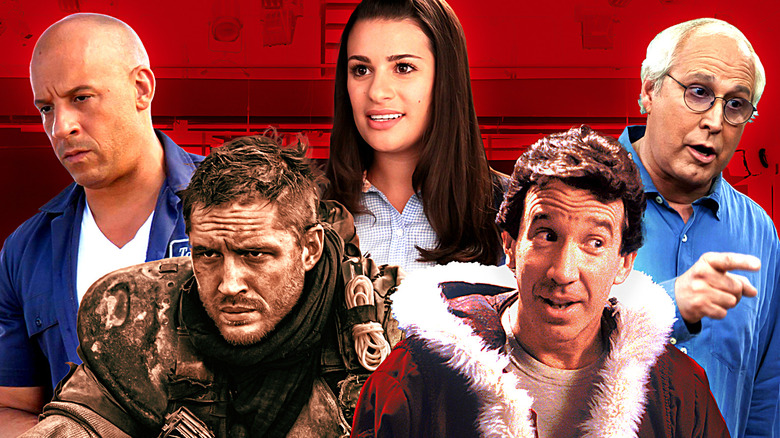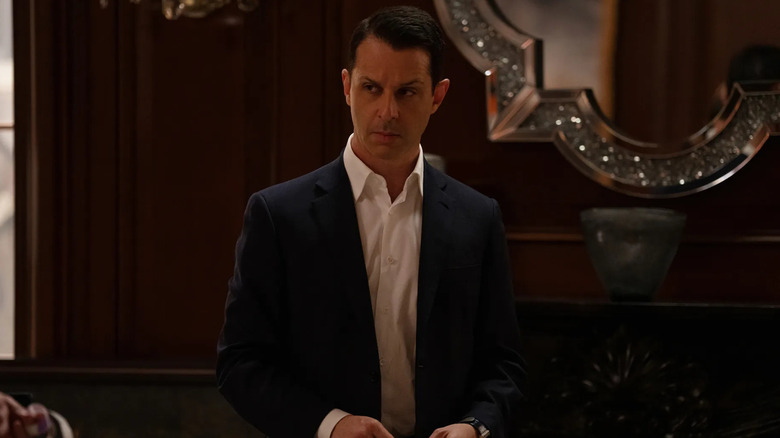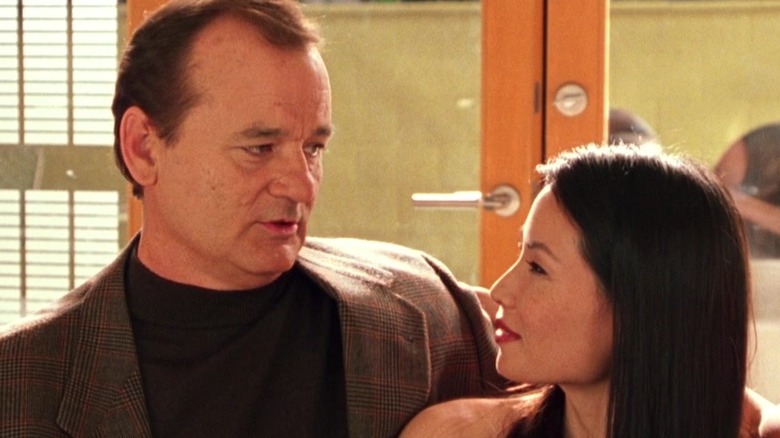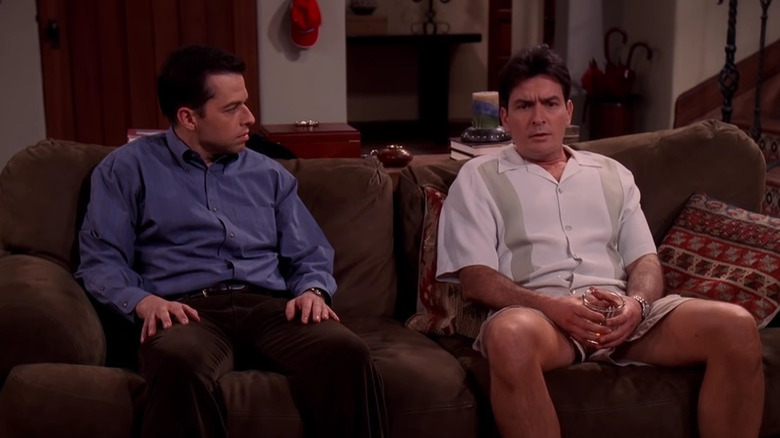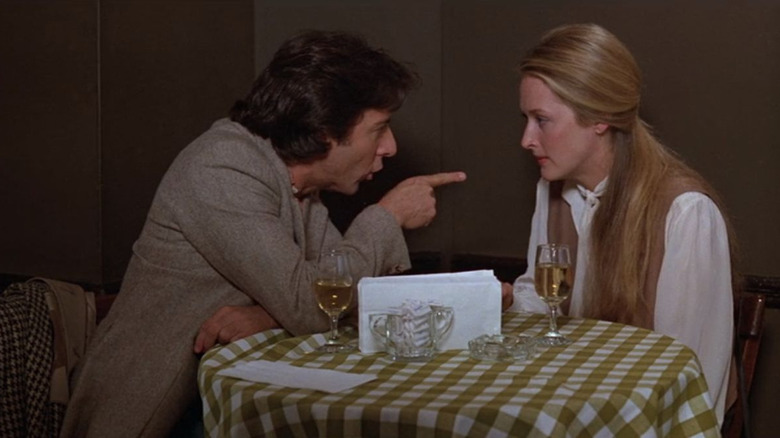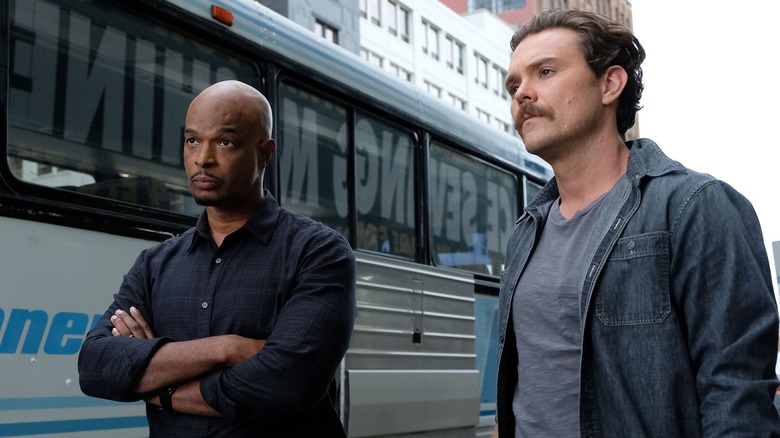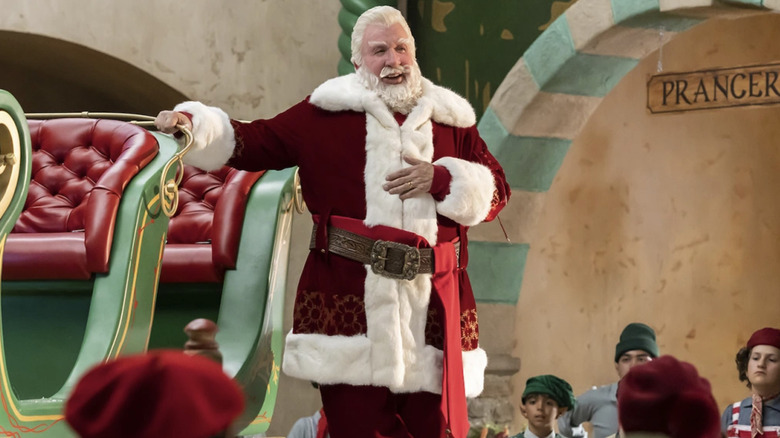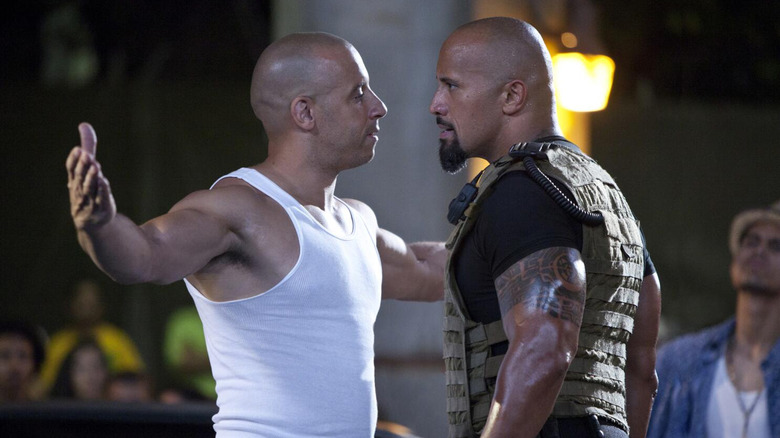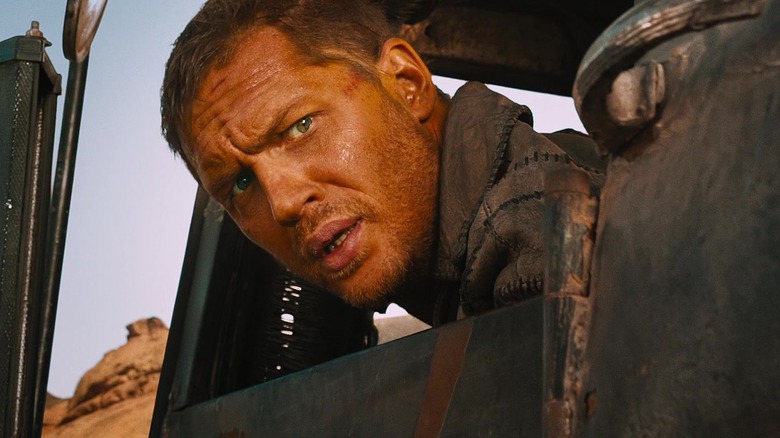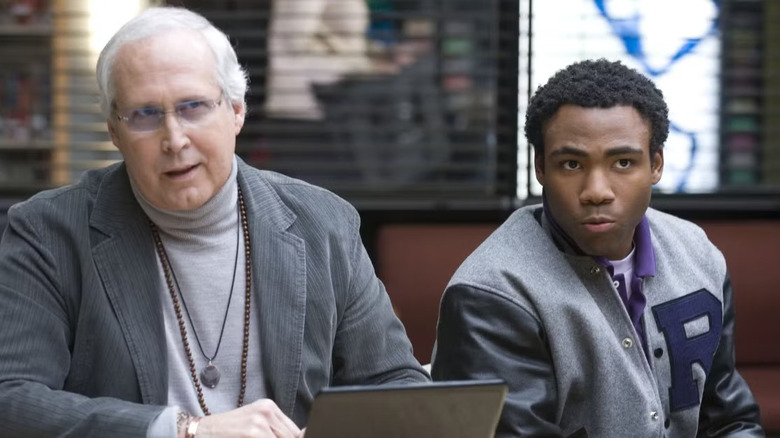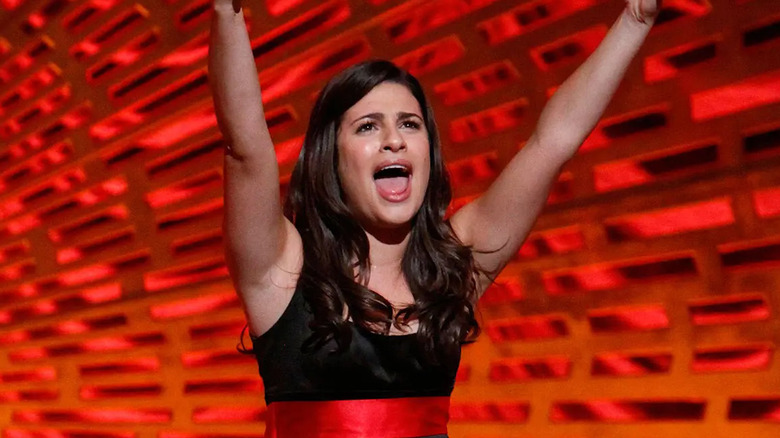Famous Actors Who Are Difficult To Work With, According To Their Co-Stars
Make no mistake: actors are an incredibly important part of the filmmaking process — even when they make it exponentially harder than it has to be. Artists and storytellers in their own right, these craftspeople channel intense emotions and experiences into performances that help us empathize with the world.
Unfortunately, however, it seems this sort of job attracts intense, eccentric personalities as well. As a consequence, actors can be difficult to work with and, at times, inexcusably horrible even to their closest peers. Though some of them may claim their abuses as part of a grander process — mere speed bumps on the journey to truth-telling — the effect they have on the vulnerable people around them cannot be dismissed.
In the cases we found specifically, the actions of the actors have been publicly called into question by their scene partners, further disproving that much of this behavior is normal or otherwise beneficial to telling stories. At the end of the day, film and television sets are workplaces, and there's no reason for anyone working on them to feel in danger — emotionally or physically — at any time.
Here are some famous actors who were difficult to work with, according to their co-stars.
Jeremy Strong's Succession co-stars were worried about his method acting
In the wake of his third critically acclaimed season on HBO's buzzy "Succession" (a satire about a fictional media empire in decline, which won the network 19 Emmy awards), The New Yorker interviewed actor Jeremy Strong, resulting in a now infamously unflattering profile in which he discussed his isolating approach to playing Kendall Roy. In addition to refusing to rehearse scenes with his fellow actors (because, in his view, acting a scene should feel unpredictable and terrifying, like "encountering a bear in the woods"), he apparently tried to stay in character as much as possible when on set.
Discussing how this affects the other actors Strong worked with, Kieran Culkin (who played Kendall's younger brother Roman Roy) spoke diplomatically. "[His method] might be something that helps him," he told The New Yorker. "I can tell you that it doesn't help me." Meanwhile, during his own profile for Vanity Fair, Matthew Macfadyen (Kendall's brother-in-law, Tom Wambsgans) apparently became visibly frustrated at the mention of the New Yorker piece, as it gave the impression that those working outside of Strong's self-destructive method were somehow not as dedicated to the craft or the show. Further, he felt it wrongly painted a picture of Strong and his work as the focal point of "Succession." "I find it slightly aggravating because — it makes [the show] about one thing, and it's an ensemble piece," he said.
Brian Cox (Kendall's imposing father Logan Roy) was most explicit in his criticisms, openly wishing Strong would stop working in this manner. "It's f***ing annoying," he told Town and Country. Strong, seemingly, didn't take any offense at the words of collaborators, and he specifically said of Cox to GQ, "[H]e's earned the right to say whatever the f*** he wants."
Bill Murray sounds downright abusive to his co-stars
Bill Murray — once beloved almost universally for his persona as a lovable curmudgeon — has experienced a sharp fall from grace in recent years as the public has begun to reexamine troubling stories from his previous collaborators. This largely came in the wake of production being suspended on Aziz Ansari's "Being Mortal," which Murray was supposed to star in before allegations made against him effectively ended the project.
Long before that, stories of Murray's alleged malignancy had been brought to light. Richard Dreyfuss described him as an "Irish drunken bully" while filming "What About Bob?," and he said Murray threw a glass ash-tray at his head after shouting insults at him one night after dinner. Meanwhile, Murray's "Charlie's Angel" co-star Lucy Liu said he verbally attacked her while working on the 2000 film.
Charlie Sheen's erratic behavior ruined his friendship with Jon Cryer on Two andX$ Half Men
If you didn't live through Charlie Sheen's bizarre and tragic string of public interviews leading up to his firing from "Two and a Half Men," it's a bit hard to describe. At a time when traditional news media shared more even ground with burgeoning social networks online in terms of cultural relevance, it was almost as though his worst moments were made viral twice over. Sadly, much of his behavior both in these interviews and on the set of the CBS sitcom have been attributed to a substance abuse disorder.
For Jon Cryer, it was difficult watching someone he once enjoyed working with turn into a force of unbridled self-destruction — especially since his livelihood was tied to Sheen at the time. "[Sheen's behavior] was very, very strange, and [there were] aspects of it that I absolutely hated," he said on the Couch Surfing podcast in 2020, "but you know, I'm thankful for the years that were great." In 2024, he reiterated his sadness at how things ended between the two of them (via EW), but insisted he had no interest in working with Sheen ever again.
If you or anyone you know needs help with addiction issues, help is available. Visit the Substance Abuse and Mental Health Services Administration website or contact SAMHSA's National Helpline at 1-800-662-HELP (4357).
Dustin Hoffman hit Meryl Streep during Kramer vs. Kramer
In the midst of the #MeToo movement, following wider revelations about Harvey Weinstein's abuses of power, Meryl Streep spoke candidly in the New York Times about the danger she's personally experienced as a consequence of gray areas and crossed boundaries in the film industry. According to the three-time Academy Award-winner, while working on 1979's "Kramer vs. Kramer" (an acclaimed drama about a couple going through a messy divorce), fellow actor Dustin Hoffman struck her without warning or consent while shooting a scene.
"[T]his was my first movie, and it was my first take in my first movie, and he just slapped me," she said in the Times. "And you see it in the movie. It was overstepping." The incident is made all the more troubling by the fact that Hoffman was actually going through his own divorce at the time of filming, and by his own admission, he was at times taking out his emotions on Streep.
The Clayne Crafword-Damon Wayans feud almost led to a brawl on the Lethal Weapon set
While shooting the second season of the Fox buddy-cop dramedy series "Lethal Weapon" (based on the Mel Gibson-Danny Glover film series of the same name), the apparently cold working relationship between stars Clayne Crawford (stepping into the role of Gibson's Martin Riggs) and Damon Wayans (Glover's Roger Murtaugh) escalated nearly to the point of violence between the two. Per a report from Variety, which gathered over 30 interviews from cast and crew members who witnessed the events that ultimately led to Crawford's termination, it largely stemmed from an episode which the actor also directed.
A scene involved a sizable explosion, shrapnel from which injured Wayans' head. Though he allegedly said he was fine and even declined medical treatment immediately afterward, he returned to set the following day, and according to Variety's sources, he tried to take action against the special effects team. Crawford (who later described the accident as "unfortunate," despite all safety precautions being followed, was caught on tape berating Wayans, reportedly because of this confrontation, calling him a number of unkind names (the only printable one being "crybaby") and telling him he's only successful because of his family.
Things escalated further when Wayans' refused to shoot a scene involving firearms later that same day, at which point a verbal altercation took place between the two parties, resulting in the shoot's premature end. Wayans later took to social media and accused Crawford of making women cry on set and hitting Lance Henriksen in the mouth with a bottle of green tea, which allegedly led to stickers being placed on the lot that called Crawford an "emotional terrorist." Ahead of the show's third season, Crawford was replaced by Sean William Scott.
Tim Allen was anything but jolly to Casey Wilson during The Santa Clauses
While filming the first episode of the Disney+ series "The Santa Clauses" (based on the early-2000s Christmas film series "The Santa Clause"), star Tim Allen was allegedly treating his coworkers in a way worthy of the Naughty List. According to writer and actor Casey Wilson (who appears in the premiere episode as the adult version of the character Sara), Allen was "f***ing rude" and the "single worst experience [she'd] ever had with a co-star ever."
Her issue specifically stemmed from their scene together, during the filming of which Allen complained to a producer — in front of Wilson — that she was stepping on his lines. "The producer turns to me with horror on his face and has to walk one foot to me, and he goes, 'Um, Tim would ask that you stop stepping on his lines,'" she recalled on the B**** Sesh podcast. She went on to say that he made the environment on set uncomfortable by refusing to speak to other people or make eye-contact. According to a crewmember who spoke to Wilson, she was experiencing the "Toy Story" star "on a good day."
Wilson isn't the first actor to describe him as hard to work with. Alan Rickman said he was disruptively and negatively provocative on the set of "Galaxy Quest," and Pamela Anderson accused him of flashing her on the set of "Home Improvement." (Allen has denied the latter allegation, per The Hollywood Reporter.) He was also reportedly disrespectful to Rene Russo on "Big Trouble," with director Barry Sonnenfeld recalling an instance in which Allen called the former model unattractive to her face.
Vin Diesel's tough love drove Dwayne Johnson out of the Fast and Furious franchise
Coming from the world of professional wrestling, Dwayne Johnson is certainly no stranger to big personalities. Then again, there is perhaps no personality bigger than Vin Diesel's.
Tension between Johnson and certain members of the "Fast and Furious" cast began in 2017 over allegations that he was inadvertently throwing the brakes on the franchise's forward momentum by diverting the studio's attention to his solo film. It upset Roman Pearce actor Tyrese Gibson so much that he threatened to quit the franchise (it's worth noting he apparently harbored some resentment from a scathing but dubiously sincere review Johnson gave to his album "Black Rose").
Though Diesel seemingly backed Johnson by publicly stating that no single actor was necessarily to blame for the delay of "F9" (which was delayed even further by the string of Hollywood Coronavirus cancellations), it was revealed by Johnson himself not long afterward that he and Diesel couldn't film any scenes together for "The Fate of the Furious" due their fractured relationship. "[W]hat I came to realize is that we have a fundamental difference in philosophies on how we approach moviemaking and collaborating," he told Rolling Stone in 2018. "It took me some time, but I'm grateful for that clarity." Johnson did not return for "F9."
Though Johnson kept the reasons for his obvious frustration with Diesel vague, Diesel later said in an incendiary interview (in which he basically takes credit for Johnson's acting) that he used "tough love" as a producer to get what he wanted from Johnson as an actor. Johnson openly laughed at Diesel's characterization before telling reporters he was done with the "Fast" franchise for good. Even after he admitted the public back-and-forth was regrettable, Johnson rejected Diesel's invitation to return to the franchise. Of course, the story ends happily with Johnson squashing the beef by coming back for the post-credits scene of "Fast X."
Tom Hardy and Charlize Theron created a tense workplace on Mad Max: Fury Road
Speaking of fast cars, big personalities, and hot tempers, the "Mad Max" franchise is apparently a particularly tough one to be a part of. It's no secret that shooting intensely physical and emotionally super-charged action scenes in the desert for several weeks straight is exhausting, but it takes a greater toll than probably any of us can understand. Not even "Furiosa" star Anya Taylor-Joy was prepared for how tough her shoot would be — though it sounds like it didn't even come close to the tense working environment Tom Hardy and Charlize Theron created on its predecessor, "Mad Max: Fury Road."
As revealed in Kyle Buchanan's "Blood, Sweat, and Chrome: The Wild and True Story of Making Mad Max: Fury Road," the two actors had a fiery on-set feud that greatly affected them both, as well as the rest of the cast and crew. "[Their relationship] seemed to implode in preproduction," said first assistant director P.J. Voeten in Buchanan's book. "We weren't even shooting and there seemed to be this animosity."
Director George Miller essentially concurred, postulating that the hostility of the world and the characters themselves was to blame. Other crew members chalked it up to different working styles, with Hardy's meticulous and method approach conflicting with Theron's. It also didn't help that, as production continued and the relationship soured further, Hardy became a recluse who wouldn't emerge from his trailer on time.
"It was a tense atmosphere at times," said Nicholas Hoult, who played the War Boy Nux. "It was kind of like you're on your summer holidays, and the adults in the front of the car are arguing." Theron accepted this characterization. "It was horrible," she admitted. "We should not have done that; we should have been better. I can own up to that."
Chevy Chase was a slur-slinging bully to Community cast
What can be said about Chevy Chase's "Community" tenure that hasn't already been said? The "Saturday Night Live" alum was notoriously difficult to work with as aging man-baby Pierce Hawthorne, so much so that he and his (arguably equally dysfunctional) boss Dan Harmon had a dramatic falling out that played a significant role in the latter's temporary firing.
Even under new creative leadership, Chase continued to cause trouble. While filming a season 4 episode ("Advanced Documentary Filmmaking"), he took umbrage with how his character was, in his opinion, being written to be more racist. Bafflingly, he attempted to prove his point by dropping a racial slur, which obviously made multiple cast members uncomfortable and turned into a media storm when it leaked to the press.
Chase left the series, returning only for a cameo in season 5 after he and a re-hired Harmon reconciled. Donald Glover (whose character Troy was often one of several targets for Pierce's racism) implied as part of a joke afterward that Chase had at some point used the same word toward him. The multi-hyphenate artist and "Atlanta" creator-slash-star also told The New Yorker in 2018 that Chase explicitly tried to undermine his comedic talent based on his race (which Harmon confirmed in the same interview), telling Glover, "People think you're funnier because you're Black."
"I just saw Chevy as fighting time," he told The New Yorker, "A true artist has to be okay with his reign being over. I can't help him if he's thrashing in the water. But I know there's a human in there somewhere — he's almost too human." Chase has gone on to disparage the cast and crew of "Community" numerous times, prompting Joel McHale to fire back by sharing that the negative memories of their time together are mutual and confirming that Chase would not be allowed to return for the upcoming film. Regardless, when it comes to being called a jerk, it doesn't seem like Chase cares.
It seems no one likes working with Lea Michele
Having made the rare jump from Broadway to Hollywood, it would seem Lea Michele should be inspiring nothing but "Glee" in both herself and her co-stars. Unfortunately, the opposite appears to be the case.
Samantha Marie Ware — who worked with Michele on the Fox musical dramedy — accused her of making her first job on television a "living hell" by subjecting her to multiple racist micro-aggressions and threatening to defecate in her wig (per Variety). Ware's story upset many "Glee" fans and created space for other former cast members to speak out. Season 5 co-star Dabier Snell said on Twitter that Michele refused to let him sit with her and told him he didn't belong with the rest of the cast. Series regular Heather Morris described her in a Tweet as "unpleasant to work with" and disrespectful, assuming partial blame for allowing her treatment of others to persist unchecked. Melissa Benoist, Yvette Nicole Brown, Alex Newell, and Abigail Breslin all engaged with the discourse in subtler ways, seemingly supporting those speaking out against Michele.
Finally (and perhaps most damningly as well), her former Broadway castmate Gerard Canonico wrote on her Instagram page, "You were nothing but a nightmare to me and fellow understudy cast members. You made us feel like we didn't belong there. I tried for years to be nice to you to no avail." Michele has since expressed some regret at the stories shared and described the fallout as "eye-opening" in an interview with Interview Magazine.
